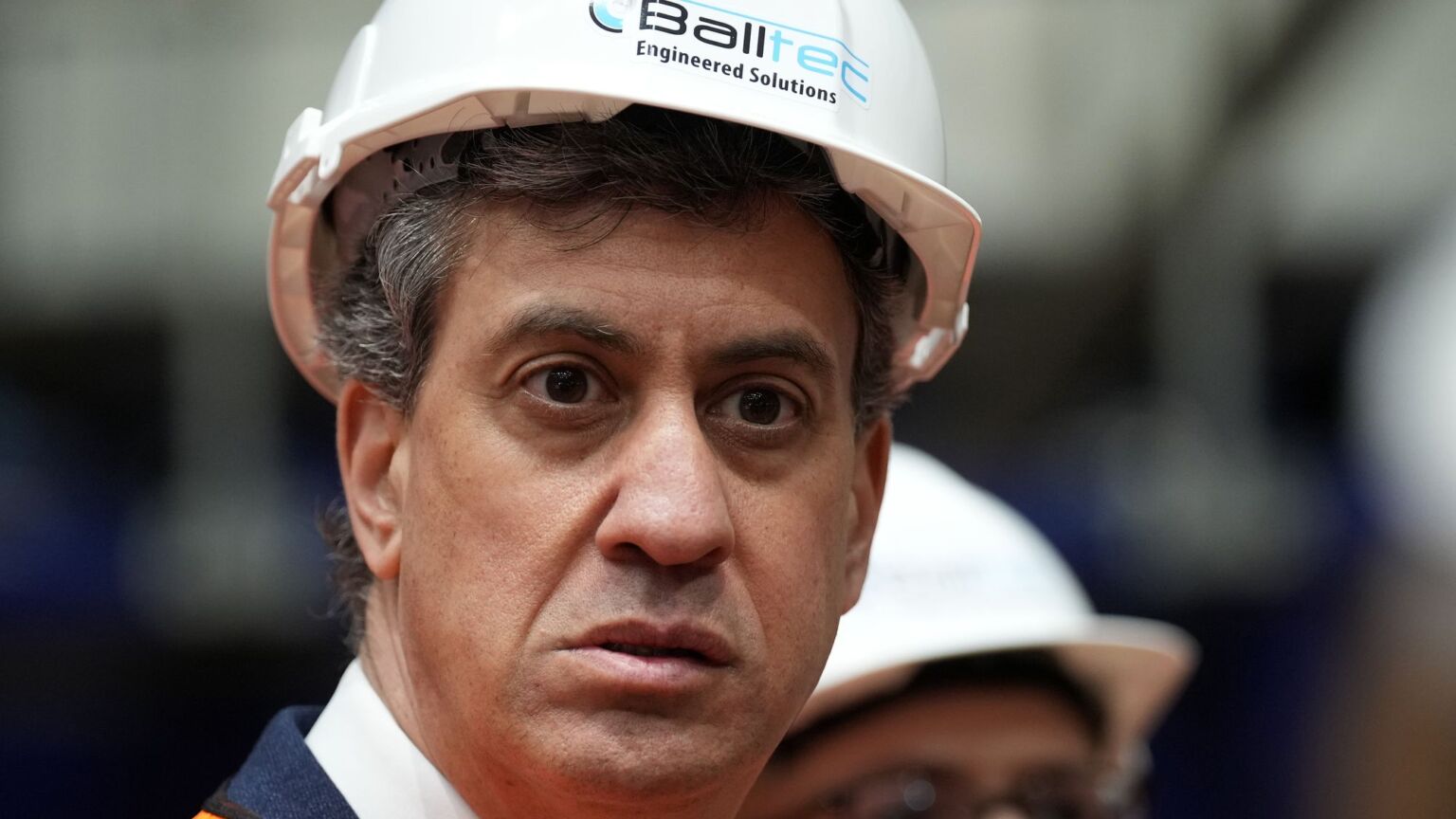Get ready for the Ed Miliband blackouts
Labour’s lies about renewable energy will leave Britain in the dark.

Want to read spiked ad-free? Become a spiked supporter.
Before July’s UK General Election, the Labour Party made two ambitious promises. One was to get the British economy growing faster than any other in the G7. The other was to decarbonise the electricity grid by 2030. The snag is that the two aims are entirely contradictory. One was always going to have to give way for the other. And now we know for certain which has won out.
Figures released today revealed that the UK economy shrank by 0.1 per cent in October, the second month of contraction in a row. Although it is still early days for the Labour government (the growth figures predate its first budget), any hope that this government would kickstart the British economy after decades of stagnation was surely dashed by announcements made by energy secretary Ed Miliband earlier today.
As part of his new Clean Power 2030 Action Plan, Miliband has restated his promise to ‘sprint’ away from fossil fuels and towards ‘clean, homegrown energy’ (although he now says the grid will be 95 per cent carbon-free by 2030, rather than 100 per cent). The biggest change announced is that new planning rules will make it easier to build on-shore wind farms. Miliband claims all this will lower energy bills for households and businesses; lead to an industrial renaissance with thousands of new jobs; and guarantee a steady, secure supply of energy unaffected by the volatility of global markets. But all of these claims are straightforwardly untrue.
Indeed, even Miliband has been forced to tacitly acknowledge that energy prices are unlikely to go down any time soon. Speaking on BBC Radio 4’s Today programme this morning, he struggled to defend his pre-election pledge to cut household energy bills by £300, not least as the energy price cap is set to rise for the first three months of next year. As for businesses, the UK currently has some of the highest industrial electricity prices in the developed world.
While Miliband claims more renewable electricity is the solution to soaring bills, in truth, it is one of the biggest causes. This is because wind and solar are intermittent. How much electricity they produce depends entirely on the weather. Wind farms can’t produce energy when the wind doesn’t blow, and solar farms can’t produce energy when the sun doesn’t shine. Yesterday, Britain generated just 8.3 per cent of its electricity from wind, because wind speeds are typically slow in winter. Because we want to keep the lights on, we have to source the rest of our electricity from elsewhere, usually from gas. Having gas power plants in reserve, turning them off and on to fit the whims of the weather, is far costlier than simply burning gas continuously.
Building new wind farms, as Miliband plans to, doesn’t resolve these problems – it just creates new ones. Britain already has so many wind farms that on days when it’s too windy, electricity ends up being wasted. This year, the UK spent more than £1 billion paying operators to turn off their turbines to prevent the grid from being overloaded. All this adds to the price of electricity.
It is these exorbitant electricity costs that disprove Miliband’s second point – that Net Zero can be a spur for reindustrialising Britain. Heavy industry, after all, is particularly sensitive to energy prices. Net Zero is already contributing to closures of major car plants, steelworks and oil refineries, costing thousands of jobs.
Finally, Miliband’s promise of secure domestic energy supplies is also a misnomer when the output of renewables can vary so radically depending on the weather. This actually increases our dependence on imports and the global market. One adverse effect of this is that Norway is now considering cutting off its electricity interconnectors to the UK and the EU. During the winter, when the wind stops blowing, international demand for Norwegian hydropower and fossil fuels surges, pushing up domestic prices. Understandably, Norwegian consumers don’t want to have to pay for the green delusions of Britain and Germany’s elites.
All this creates the perfect conditions for blackouts. Imagine a windless winter night in 2030. By then, Miliband will have shut down much of our oil and gas generation. Our friends in Norway will be sick of paying higher bills and won’t want to bail us out. Where, then, does the power come from? Earlier today, Miliband tried to stress that there would be no risk of blackouts in his clean, green-powered Britain. But given his dishonesty and delusions about renewables, how can anyone feel reassured by such a claim?
The truth is that, with Miliband in charge of our energy system, Britain is sleepwalking into disaster. His nonsense, distortions and delusions about renewable energy are going to leave us in the dark.
Fraser Myers is deputy editor at spiked and host of the spiked podcast. Follow him on X: @FraserMyers.
Picture from: Getty.
Who funds spiked? You do
We are funded by you. And in this era of cancel culture and advertiser boycotts, we rely on your donations more than ever. Seventy per cent of our revenue comes from our readers’ donations – the vast majority giving just £5 per month. If you make a regular donation – of £5 a month or £50 a year – you can become a and enjoy:
–Ad-free reading
–Exclusive events
–Access to our comments section
It’s the best way to keep spiked going – and growing. Thank you!










Comments
Want to join the conversation?
Only spiked supporters and patrons, who donate regularly to us, can comment on our articles.